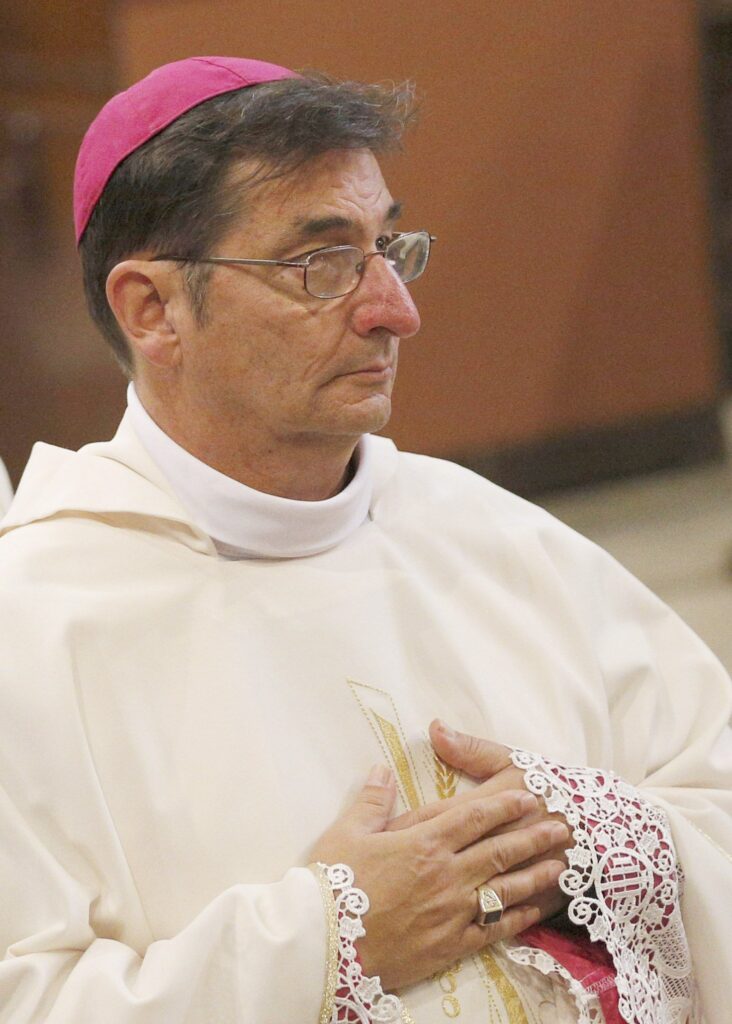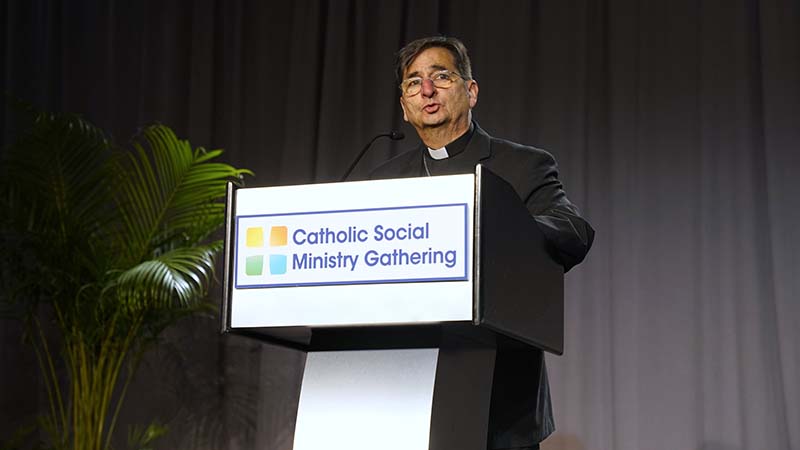(OSV News) — Just a month ago — when speaking to Latino Catholics from the National Catholic Council for Hispanic Ministry — Pope Leo XIV made a notable comment concerning the U.S. bishops’ public stance on escalated immigration enforcement tactics in their country: “The church cannot be silent … I wish there were a stronger, more united voice.”
The U.S. policy of mass deportation toward immigrants lacking legal authorization to be in the U.S., potentially affects one in six Catholics (18%) in the U.S., either because they are vulnerable personally or live with someone who is, according to a joint Catholic-Evangelical report issued earlier this year. The vulnerability falls disproportionately on Hispanic Catholics, a group that has driven 71% of the church’s growth in the U.S. since 1960. According to Pew, eight out of 10 Hispanic Catholics are either born outside the U.S. (58%) or are the children of an immigrant (22%).
The bishops are expected to address the subject of immigration at the U.S. Conference of Catholic Bishops‘ Nov. 10-13 plenary meeting in Baltimore.
One prelate whose voice is quite robust on immigration issues — and aligned with Pope Leo’s call for “deep reflection” about the U.S. government’s treatment of migrants held in detention — is Bishop Joseph J. Tyson of the Diocese of Yakima, Washington.
His diocese is located in central Washington — one of the world’s leading sources of apples and other produce, largely harvested through migrant labor. Yakima County itself has an estimated 24,000 unauthorized immigrants. During harvest, the region may have 100,000 migrant farmworkers, many on agricultural visas.
This interview — conducted Oct. 28 — has been edited for length.
OSV News: What are some of the most important church teachings you would mention concerning immigration?
Bishop Tyson: John Paul II taught very clearly (in his 1993 encyclical “Veritatis Splendor”) that deportation is an intrinsic moral evil.
I think it also got opened up in a dramatic way in (the U.S. and Mexican bishops’) 2003 statement, “Strangers No Longer: Together on the Journey of Hope” … That really takes up some principles that can guide people doing public policy. It kind of ratchets it down to a more practical level of … what are some principles that can assist those in public life and public policy in implementing just immigration reform.
The first principle (in “Strangers No Longer”) was that folks have a right not to immigrate. In other words, conditions should be such in their country — economically and civilly — that they’re not forced to migrate due to violence, or economics, or whatever.
But then, if conditions are not such that people are able to meet their moral natural commitment to their families, folks have the right to migrate. That’s very strong in there.
Then, there is the right to secure borders — but that is not the top issue.
The tools are there. It’s just really hard to find pathways — because my own read is we’re pretty far down the road of unjust treatment of migrants, refugees, and asylum-seekers. We’re so far from embracing John Paul II’s articulation around deportation. And we’re very far from really assimilating any of the practical principles that were laid out in “Strangers No Longer.”
It appears to me that we’ve gotten farther away from following church teaching, rather than closer — which is just very, very sad.
OSV News: Immigration is sometimes referred to as a matter of prudential judgment. What are your thoughts about that?
Bishop Tyson: For people to say that church teaching on immigration is a matter of prudential judgment is incorrect. That is simply not true. It is not a matter of prudential judgment. We have very clear papal teaching from Pope John Paul II. There’s going to be some prudential judgment about how we go about assimilating the teaching.
But I’m just conscious that the Holy Father, Pope Leo, wants us bishops speaking in one voice. I think that we’re trying to figure out how to find that one voice right now — in the middle of really some harsh, crude, and abusive situations that are clearly occurring among our parishioners at the hands of a very aggressive immigration enforcement.
OSV News: Americans have traditionally prided themselves on being an immigrant country, a “melting pot.” Do you think the current political divide on immigration impacts the church’s ability to provide a voice on this issue?
Bishop Tyson: You can argue politics, but you can’t argue a person’s story. I think when parishioners know the story of their priests, or their seminarian, or even their parishioner, they tend to understand the church teaching — and might even wonder about our public policy.
There are certain sectors of Catholic media that really are not faithful to church teaching, and who propose in their advocacy journalism on television — and sometimes radio — a position that’s at variance with church teaching. Expanding the understanding of prudential judgment, they put under prudential judgment things that are not prudential judgment. John Paul II taught very clearly that deportation is an intrinsic moral evil. … There’s a sense that certain sectors of Christianity — including some even in Catholic media — have minimized and greatly attenuated the strength, sharpness, and directness of what we’ve been teaching on immigration. And perhaps it’s easy to understand how regular persons would be misled by this.
There’s a meshing of politics with religion.
I think the question we have to ask is, “Do you love Jesus? Do you love Jesus more than your political party? Do you love Jesus more than your opinion about any given public policy issue? Do you love Jesus and your Church more than your particular stance?”
That’s where this is coming down — because I think what we have happening is, people are saying, “Well, you know, I’m taking a stand against unlawful immigration because I love Jesus, and I believe in the church, and I believe in the following of the law.”
That’s kind of backwards — and I think there’s a very strong threat of (a) Christianity that is teaching things that really are inconsistent with what Jesus taught. It has a powerful pull — and those threads of Protestant evangelical Christianity, a particular brand of Christianity, have splashed into the Catholic Church.
I’m listening to not only evangelical Christians, but Catholics say, for example, that God used Cyrus, a secular emperor (of biblical Persia), to do great things — and therefore we should be in front of politicians, even if they don’t act Christian or speak Christian, or say unchristian things, because they’re going to back our church. And so this has suddenly become about politics, rather than about faith. It’s a serious reversal going on.

OSV News: What can the U.S. bishops do or say to clarify this issue?
Bishop Tyson: The difficulty is in our culture; we have a cultural difficulty.
It’s important for us bishops to be speaking with a united voice on immigration. I think we have. The Holy Father has. John Paul II did. Pope Benedict did. Certainly Pope Francis — this was one of his signature concerns. And this is now the case with Pope Leo. I think the church teaching is clear. But I think it’s really hard to have it well received in a culture that’s so polarized.
And we have to find ways to listen to the concerns. I realize you have folks in the pews who feel like they’re foreigners in their own country and their own parish, because of the demographic change that’s occurred in the United States. But do you love Jesus more than your nationality? Do you love Jesus more than you love your country, or your idea of what the country is? Do you love Jesus more than your political opinion?
The answer really is preaching Christ fully — fully preaching the Gospel, and putting that before politics.
We’re not talking about open borders; we need to know who’s coming and going. But our biggest priority has to be loving Christ — and loving Christ in our neighbor. That comes first. Before nation; culture — I mean, that’s the Gospel. That’s the story of the Good Samaritan; the story of who’s my neighbor. But I’m afraid we’ve sometimes lost track of that with the rhetoric on social media, and even in public policy discussions, and even from some of our own political leaders.
OSV News: Is there anything else you’d like to add?
Bishop Tyson: We need to stand with the migrants, the refugees, the undocumented — because that’s the test of our faith and church. We’re being tested. And we need to find ways to do that civilly, and in charity. We can’t just be involved in power politics.
What we need to do is preach the Gospel, and uplift that — and continue to walk with people patiently who really struggle with finding a way to love their country, and love their neighbor, and love their nation, and love God, and do that in the right priority.
I sometimes have the impression that people believe that America is first; that nation is first; that politics is first — and that they use their faith and their religion to support their pre-existing ideology. That’s kind of where the danger is, as I see it — but I don’t want to be a lone ranger on that.
We need to be speaking together, in one voice, as bishops. And praise God, we’ve had wonderful holy fathers that have been very clear on the teaching. We’re just having a hard time knowing how to preach it in a culture that’s so polarized and divided.
Kimberley Heatherington is an OSV News correspondent. She writes from Virginia.




